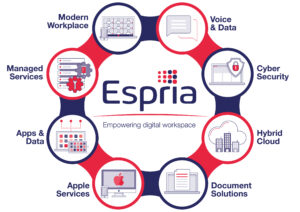The future of work is amorphic; companies must adapt their cyber security policies faster than WFH policies or risk cyberattacks.
According to a report earlier this year, the amount of vacant office space across the UK has jumped 65 per cent over the past three years, which raises concerns about the efficacy of current office designs and IT security measures. For employers to address these issues, they must rethink the modern office from the point of view of the office itself.
Dave Adamson, CTO at Espria, confirms there has been a noticeable shift in companies’ attitudes towards the location of their employees.
“For instance, Zoom, whose video conferencing tool enabled the rapid transition to remote work during the pandemic, now mandates that employees residing within 50 miles of a Zoom office must attend work at least twice a week. However, the ability to work from anywhere is a significant motivator for today’s workforce. Following Zoom’s announcement in September, regarding the return to in-person work, the number of searches for remote work in the UK in the subsequent few days increased by almost 200%”.
The future of the modern workplace is amorphic, so companies must adapt their IT needs, from hardware and office furniture to security.
“Data is a valuable commodity; organisations must ensure workers can operate securely and privately. These tools must also warrant that data is not accidentally or intentionally shared outside the organisation. Organisations must have clear policies and procedures to protect their data and support their employees in compliance”.
Adamson continued, “Working remotely can pose a significant security risk to company data, as it may lead to data breaches, identity theft and other negative consequences. Firewall rules and email policies are two of the many factors that contribute to weakened security controls. Remote employees can be more vulnerable to cyber threats since multiple protection layers may not apply. When employees bring their work devices home, they may no longer have access to the protection provided by the office network and instead rely on their home Wi-Fi”.
Adamson concluded, “Allowing remote work is crucial, but security risks must be addressed first. This applies to both permanent and occasional remote workers. By effectively managing this challenge, companies can reap the benefits of increased talent retention and productivity as well as improving the work-life balance for their staff. Companies must take appropriate measures to protect the data exchange between offices and remote workers. Enabling a secure method of accessing corporate resources, either on company or employee-owned equipment, is vital. Ultimately, prioritising data security is essential for companies to ensure a successful remote working model”.
To read more about our Hybrid Cloud solutions, please click here.

